|
|
|
Sort Order |
|
|
|
Items / Page
|
|
|
|
|
|
|
| Srl | Item |
| 1 |
ID:
143282
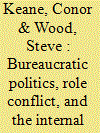

|
|
|
|
|
| Summary/Abstract |
Among the many challenges confronting the United States and its allies in Afghanistan were cohesion and communication problems in state-building programs. Merging role theory and bureaucratic politics approaches, this article argues that US Provincial Reconstruction Teams (PRTs), the composite groups charged with implementing these programs, suffered from incompatibilities between sectors of government, among which the military was dominant. US PRTs were affected by role conflict, resulting from varying and often competing organizational cultures with divergent role conceptions.
|
|
|
|
|
|
|
|
|
|
|
|
|
|
|
|
| 2 |
ID:
053385
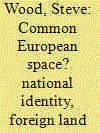

|
|
|
|
|
| Publication |
Autumn 2004.
|
| Summary/Abstract |
In central and eastern Europe, symbiosis between particular ethnic-cultural nations and territorial areas is understood as corresponding to a natural and moral order. European Union enlargement challenges this mindset by legally transforming ‘national territory’ into ‘supranational’ real property or even opening the possibility of restitution claims by ‘foreigners’. In the Polish and Czech cases this is highly contentious, principally due to the prospect of Germans and/or Austrians obtaining land. Rather than representing prosaic exchange among neutral economic agents the issue is embroiled in a complex of political and emotive influences, with historical roots that run deeper than the communist era. Realisation of a common European legal order is accompanied and to some extent hindered by misgivings about a liberal space of free access, unrestricted capital movement and no discrimination on grounds of nationality.
|
|
|
|
|
|
|
|
|
|
|
|
|
|
|
|
| 3 |
ID:
176122
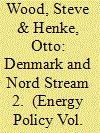

|
|
|
|
|
| Summary/Abstract |
This article analyses Denmark's involvement with the Nord Stream 2 gas pipeline project. Impressing the Baltic as a sea of strategic significance and a potential international flashpoint, the controversial project thrust Denmark into a position of decision-making importance beyond its size and material power. Geopolitical and environmental considerations, and normative impetus derived from a liberal democratic political culture, influenced Danish attitudes towards the project. The impact of these concerns substantially delayed the granting of a permit for pipeline construction in the Danish marine space, frustrating governments and business in Russia and Germany. Ultimately, approval was granted because Denmark is a rule of law state. Yet the delay is crucial. More broadly, the article illustrates how, in the energy policy domain, illiberal regimes attempt to exploit liberal-democratic legal systems through nominally commercial entities, and considers the responses by other actors in this case.
|
|
|
|
|
|
|
|
|
|
|
|
|
|
|
|
| 4 |
ID:
155771
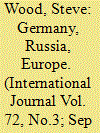

|
|
|
|
|
| Summary/Abstract |
The German and Russian nations share a long relationship. They fought the largest part of the world’s largest ever war. Resonances of that conflict and the Cold War that followed it still permeate their contemporary relationship. Under very different political systems, however, “history” is interpreted and responded to very differently. Concern for status and image, as well as geostrategic factors, motivate Russian officialdom’s disputing of the “post-Cold War order.” Germany is viewed as the pivotal state and nation in Europe. Russia seeks to influence Germany’s civil society and political elite in the attempt to obtain favourable policy outcomes. Sympathy for the Russian position within Germany is outweighed by disquiet regarding Russian foreign policy adventurism and its authoritarian regime more generally.
|
|
|
|
|
|
|
|
|
|
|
|
|
|
|
|
| 5 |
ID:
151650


|
|
|
|
|
| Summary/Abstract |
The extrajudicial killing of Osama bin Laden (OBL) on 2 May 2011 was greeted with jubilation in the United States. The dominant interpretation of the event – expressed in US media, by US political elites, and on the streets of US cities – was that justice had been served on the perpetrator of the 9/11 atrocity and thereby a great historical wrong had been righted. This article argues that the ‘justice’ deployed was a proxy for revenge, understood as the infliction of harm on those who had inflicted harm on the avenger. The argument is situated in a broader discussion of the emotional topography on which acts of state revenge are politically premised. The bin Laden case is used to explore some issues raised by the growing literature on emotions in politics and International Relations including, most importantly, how emotions are collectivised and made public.
|
|
|
|
|
|
|
|
|
|
|
|
|
|
|
|
| 6 |
ID:
174052
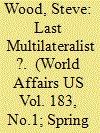

|
|
|
|
|
| Summary/Abstract |
Germany benefited most from post-war integration into liberal democratic structures, an experience that transformed it into an enthusiastic advocate of multilateralism and a model for other states. The current “illiberal turn” away from international institutions and, in some instances, international law, threatens Germany’s preferred orientation. As authoritarian regimes and populisms undermine the “liberal international order” that made Germany secure and prosperous, it may be left as one of few if not the only noteworthy advocate of multilateralism in global affairs.
|
|
|
|
|
|
|
|
|
|
|
|
|
|
|
|
| 7 |
ID:
183027
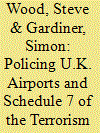

|
|
|
|
|
| Summary/Abstract |
Policing airports following 9/11 has been challenging with an emphasis on visibility and high levels of security checks for passengers. The focus has been on a form of ‘reassurance policing’ and an emphasis on procedural justice which is accepted as legitimate on the part of the public. However, there have been claims that that Muslim passengers are under greater suspicion than other passengers and have been subject to the practice of “racial profiling”. The powers under the Terrorism Act 2000, notably Schedule 7, have been under scrutiny as to the extent that they allow the police to stop and search suspects. This study reviews the opinions and experiences of young passengers at U.K. airports to see if they are reassured by policing and their opinions on profiling fellow passengers.
|
|
|
|
|
|
|
|
|
|
|
|
|
|
|
|
| 8 |
ID:
105960


|
|
|
|
|
| Publication |
2011.
|
| Summary/Abstract |
Many portrayals of the European Union (EU) as an international actor are based on selective appraisals of its external activity or restraint. This article explores the concept of a pragmatic power EUrope. It considers pragmatism as an academic approach or philosophy, and as an attitude or method of political practice. It then aims to generate interaction between these understandings by applying them to important contemporary 'partnerships' for the EU: Russia and China. These examples reveal the EU as a composite rather than unified actor, with the pragmatism of individual components undermining a more influential collective power.
|
|
|
|
|
|
|
|
|
|
|
|
|
|
|
|
| 9 |
ID:
113312


|
|
|
|
|
| Publication |
2012.
|
| Summary/Abstract |
This article assesses former Russian President Dmitry Medvedev's proposal for a new security system and varying perspectives in the context of this development. US-led unipolarity has been undermined as a gradually more independent 'Europe' has weakened transatlantic unity and that of a broader 'West'. Russia could neither join the North Atlantic Treaty Organization or the European Union (EU), nor assume directorship for security in the former Soviet Union. It has nonetheless increased its ties and influence with the EU, becoming a major trade partner and the biggest supplier of energy resources. A discourse of multipolarity accompanies Russian geopolitical ambitions and incorporates demands for new arrangements that can facilitate reliable cooperation in the security field and beyond. This implies recognising and accommodating Russian interests, which presents challenges to existing organisations. Medvedev's proposal is viewed differently by political-security sectors in the United States, Germany, France, Poland, Russia and the hybrid EU.
|
|
|
|
|
|
|
|
|
|
|
|
|
|
|
|
| 10 |
ID:
162600


|
|
|
|
|
| Summary/Abstract |
Governments of Western democracies responded quickly to the poisoning—allegedly by agents of the Russian state—of former Soviet spy, Sergei Skripal, and his daughter in Salisbury, UK in March 2018. Germany's response was not as categorically reproachful and drew attention to its relationship with Vladimir Putin's Russia more generally. It expelled four Russian diplomats and has applied sanctions since Russia's annexation of Crimea, yet continues with other bilateral trade and investment, significantly in the energy sector, and it has been hesitant about unconditionally rebuking aggressive Russian behaviour. A complex mix of domestic politics and international relations, historical memory, economic incentives, and political psychology in the age of the internet and ‘fake news’ serve to influence German attitudes toward Russia. A contest between Putin critics and sympathisers sharpens in a polity in which the majority are ambivalent. In the aftermath of the Skripal affair, some rethinking of an ambiguous policy is occurring at high levels.
|
|
|
|
|
|
|
|
|
|
|
|
|
|
|
|
| 11 |
ID:
182571
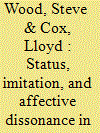

|
|
|
|
|
| Summary/Abstract |
This article explores the interplay of status, imitation and affective dissonance in international relations. Some states and nations selectively imitate others to correct perceived status deficits. Over time imitation can diminish ideals of group distinctiveness and independence from models and norm-setters, stimulating a condition we term affective dissonance. This complex of processes underlies some tensions in contemporary world politics. We apply the propositions to case studies of Russia and China whose leaders assert themselves as the principal loci and prescribers of national authenticity.
|
|
|
|
|
|
|
|
|
|
|
|
|
|
|
|
| 12 |
ID:
120758


|
|
|
|
|
| Publication |
2013.
|
| Summary/Abstract |
This article explores the concept of identity in Turkey and how issues associated with it influence Turkish relations with European states, societies, and the European Union (EU). Turkey's internal diversity is often overlooked in favor of more monolithic representations. This diversity has positive and negative dimensions for governance in Turkey and for forces wanting to maintain or regenerate momentum for accession to the EU. In comparison, EUrope is struggling to create a common identity of its own. For some Europeans, Turkey is an external unifier. Although the salience of Turkey-EUrope relations has been relatively muted as the debt crisis overwhelms other political themes, the possibility of Turkey joining the EU stimulates identity-related concerns as much as others about financial transfers.
|
|
|
|
|
|
|
|
|
|
|
|
|
|
|
|
| 13 |
ID:
183902


|
|
|
|
|
| Summary/Abstract |
‘Understanding’ for Vladimir Putin’s Russia is present across Germany’s political spectrum, in business sectors, and within society/the electorate at large. It was boosted by the outcome of the 2017 election which saw a far right party, the Alternative für Deutschland (AfD), join Die Linke, a far left party, as a ‘pro-Russia’ force in parliament. Together they obtained 22% of the vote. Voices in centre parties also urge ‘dialogue’ and conciliation with Russia. Extra-parliamentary advocates are more strident in their support. Germany’s vulnerable coalition government is confronted by Russian disinformation exploiting historical memory, discontent with policies, and scepticism towards the US, a situation exacerbated by the Trump administration. This combination of developments generates a multidimensional, underestimated, and partly realised potential for more destabilisation of Western alliances and Eurasian security.
|
|
|
|
|
|
|
|
|
|
|
|
|
|
|
|
|
|
|
|
|